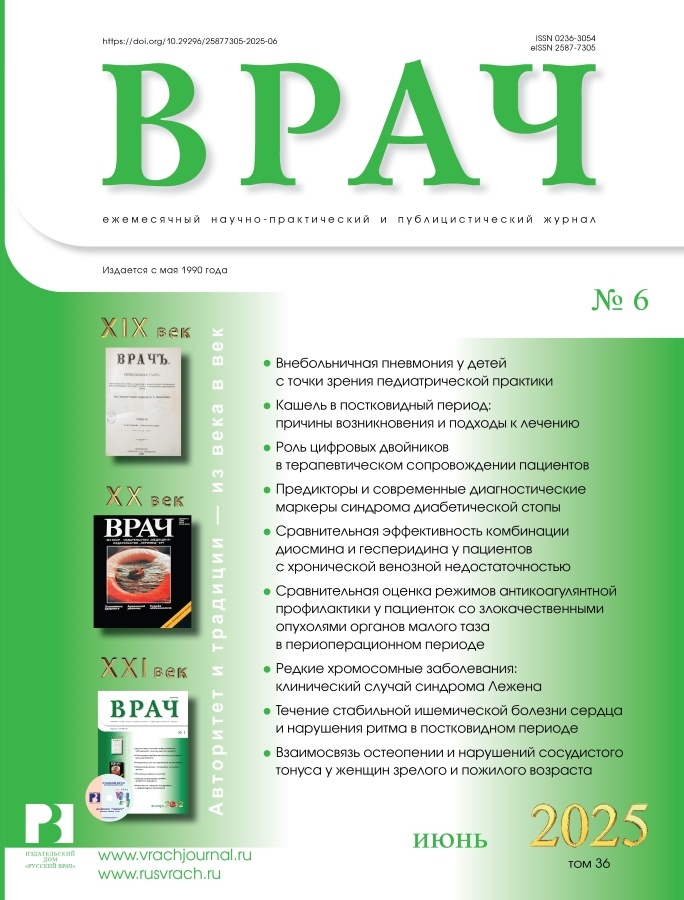Social isolation and its impact on the nature of changes in the quality of life in elderly patients with visual impairment
- Authors: Agarkov N.1,2, Popova N.2
-
Affiliations:
- Southwest State University, Ministry of Science and Higher Education of Russia
- Tambov branch of the S.N. Fedorov National Medical Research Center «Intersectoral Scientific and Technical Complex “Eye Microsurgery”» Ministry of Health of Russia
- Issue: Vol 36, No 6 (2025)
- Pages: 65-67
- Section: From Practice
- URL: https://journals.eco-vector.com/0236-3054/article/view/686592
- DOI: https://doi.org/10.29296/25877305-2025-06-14
- ID: 686592
Cite item
Abstract
Objective. Determination of the nature of changes in the quality of life (QL) in social isolation and risk factors associated with it in elderly patients with visual impairment.
Material and methods. A clinical group was formed of 115 participants aged 60–74 years who were in conditions of social isolation with visual impairment for a month. In accordance with the Helsinki Declaration, social isolation was determined on the basis of a 15-point scale, the QL-questionnaire was used to measure changes in the QL and in its 4 factors, risk factors included socio-demographic, clinical categories and indicators of functional status.
Results. The results of linear mixed models with random intersections comparing QL indicators before (3,30) and after social isolation (1,78) were significant (p<0,001). During social isolation, 87% of participants with visual impairment had a decrease in quality of life (-2,39), while 13% of participants had an increase in QL (0,58). The following risk factors were associated with social isolation: low income (38%, p<0,001), lack of higher education (29%, p=0,002), lung disease (25%, p=0,04), functional or sensory disorders, including difficulties with cooking (28%, p=0,004), difficulty passing one quarter (26%, p=0,03), hearing impairment (23%, p=0,02) and visual impairment (24%, p=0,01). Gender (p=0,39), ongoing pain (p=0,75), difficulties with daily activities (p=0,09), urinary incontinence (p=0,82), diabetes mellitus (p=0,87) and cognitive impairment (p=0,06) were insignificant.
Conclusion. The period of social isolation led to a very significant decrease in the overall QL in the sample of elderly people with visual impairment. The leading risk factors for social exclusion were low income and lack of higher education.
Full Text
About the authors
N. Agarkov
Southwest State University, Ministry of Science and Higher Education of Russia; Tambov branch of the S.N. Fedorov National Medical Research Center «Intersectoral Scientific and Technical Complex “Eye Microsurgery”» Ministry of Health of Russia
Author for correspondence.
Email: vitalaxen@mail.ru
ORCID iD: 0000-0002-4821-3692
SPIN-code: 8921-6603
Professor
Russian Federation, Kursk; TambovN. Popova
Tambov branch of the S.N. Fedorov National Medical Research Center «Intersectoral Scientific and Technical Complex “Eye Microsurgery”» Ministry of Health of Russia
Email: vitalaxen@mail.ru
ORCID iD: 0000-0002-6557-4764
SPIN-code: 4770-6919
MD
Russian Federation, TambovReferences
- Holt-Lunstad J., Smith T.B., Baker M., et al. Loneliness and social isolation as risk factors for mortality: a meta-analytic review. Perspect Psychol Sci. 2015; 10 (2): 227–37. doi: 10.1177/1745691614568352
- Агарков Н.М., Копылов А.Е., Титов А.А. и др. Особенности гериатрического статуса у пациентов с артериальной гипертензией и ишемической болезнью сердца (обзор). Научные результаты биомедицинских исследований. 2024; 10 (1): 112–25 [Agarkov N.M., Kopylov A.E., Titov A.A. et al. Features of geriatric status in patients with arterial hypertension and coronary heart disease (review). Research Results in Biomedicine. 2024; 10 (1): 112–25 (in Russ.)]. doi: 10.18413/2658-6533-2024-10-1-0-7
- Waite L.J. Social Well-Being and Health in the Older Population: Moving beyond Social Relationships. Future Directions for the Demography of Aging: Proceedings of a Workshop: National Academies Press, 2018. doi: 10.17226/25064
- Hawkley L.C., Capitanio J.P. Perceived social isolation, evolutionary fitness and health outcomes: a lifespan approach. Philos Trans R Soc Lond B Biol Sci. 2015; 370 (1669): 20140114. doi: 10.1098/rstb.2014.0114
- Hawton A., Green C., Dickens A.P. et al. The impact of social isolation on the health status and health-related quality of life of older people. Qual Life Res. 2011; 20 (1): 57–67. doi: 10.1007/s11136-010-9717-2
- Leigh-Hunt N., Bagguley D., Bash K. et al. An overview of systematic reviews on the public health consequences of social isolation and loneliness. Public Health. 2017; 152: 157–71. doi: 10.1016/j.puhe.2017.07.035
- Xia N., Li H. Loneliness, Social Isolation, and Cardiovascular Health. Antioxid Redox Signal. 2018; 28 (9): 837–51. doi: 10.1089/ars.2017.7312
- Frisch M.B. Evidence-Based Well-Being/Positive Psychology Assessment and Intervention with Quality of Life Therapy and Coaching and the Quality of Life Inventory (QOLI). Social Indicators Research. 2013; 193–227. doi: 10.1007/s11205-012-0140-7
- Valtorta N.K., Kanaan M., Gilbody S. et al. Loneliness and social isolation as risk factors for coronary heart disease and stroke: systematic review and meta-analysis of longitudinal observational studies. Heart. 2016; 102 (13): 1009–16. doi: 10.1136/heartjnl-2015-308790
- Hakulinen C., Pulkki-Råback L., Virtanen M. et al. Social isolation and loneliness as risk factors for myocardial infarction, stroke and mortality: UK Biobank cohort study of 479 054 men and women. Heart. 2018; 104 (18): 1536–42. doi: 10.1136/heartjnl-2017-312663
- Barth J., Schneider S., von Känel R. Lack of social support in the etiology and the prognosis of coronary heart disease: a systematic review and meta-analysis. Psychosom Med. 2010; 72 (3): 229–38. doi: 10.1097/PSY.0b013e3181d01611
- National Academies of Sciences E, and Medicine. Social Isolation and Loneliness in Older Adults: Opportunities for the Health Care System. Washington, D.C.: The National Academies Press, 2020.
- Holt-Lunstad J., Smith T.B., Layton J.B. Social relationships and mortality risk: a meta-analytic review. PLoS Med. 2010; 7 (7): e1000316. doi: 10.1371/journal.pmed.1000316
- Zhang Y., Ma Z.F. Impact of the COVID-19 Pandemic on Mental Health and Quality of Life among Local Residents in Liaoning Province, China: A Cross-Sectional Study. Int J Environ Res Public Health. 2020; 17 (7): 2381. doi: 10.3390/ijerph17072381
Supplementary files







